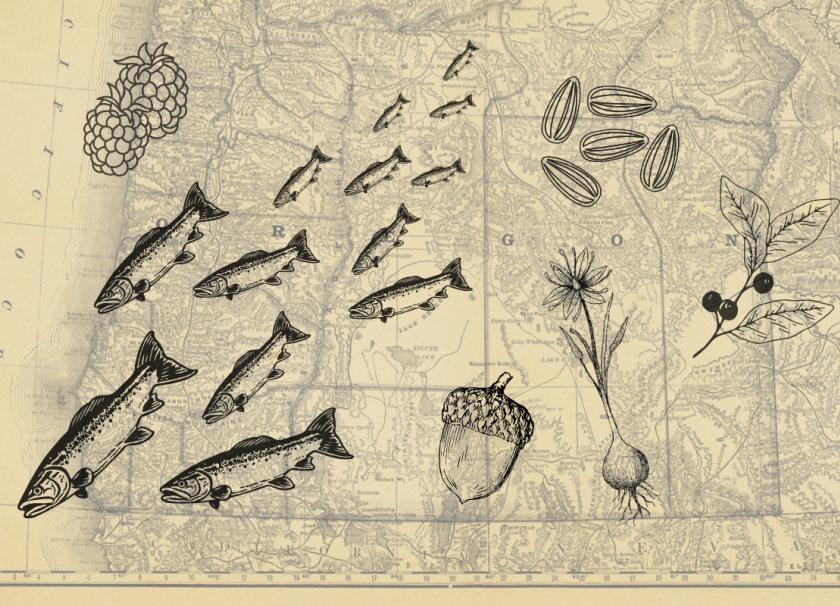
Celebrating Indigenous Food and Traditions
Each October, when so many across the country celebrate Indigenous Peoples' Day, the Ashland Food Co-op pauses to reflect on the land we call home, the people who've cared for it, and how food and connections to the land can help us return that inheritance in a positive way. This holiday isn’t just a request that we correct the record of history, but that we also plant a greater sense of home, appreciation, and responsibility. In southern Oregon, that means exploring the histories and teachings of the Shasta, Takelma, Latgawa, and other tribes whose ancestral lands include what is now Ashland.
Indigenous peoples in our region lived prior to Euro-American settlement in a deep relationship with food cycles and place. In the Rogue Valley and along the Table Rocks, the Takelma were sometimes called “Dagelma,” meaning “those who dwell by the river.” Life revolved around the waters and the changing seasons. Salmon filled their nets, while wild roots, berries, seeds, and game rounded out their meals. As the seasons changed, they followed the rhythms of the land, moving between elevations to fish, gather, hunt, and carefully store what they would need for the months ahead. Their activity wasn’t just for survival, but for reciprocity: farming soils, burning to maintain open meadows, incubating plant habitats, and honoring areas of ceremony. Their ways of tending the land remind us that we still have much to learn about balance, respect, and stewardship.
Deep disruption came in the mid-1800s: the Rogue River Wars of 1855–1856, when numerous Indigenous communities were forcibly relocated, treaties were violated, and war and disease devastated populations; the brief existence of the Table Rock Reservation was formed and abolished; and numerous descendants of these groups found themselves caught up in confederated treaties or relocated to other reservations. In spite of this break, Indigenous families still reside here, remember, revive language, and preserve cultural food traditions throughout Oregon today.
Food is one of the most powerful connections we have to memory, respect, and the planet itself. Here in Oregon, "first foods" like salmon, roots, berries, and game are still central to Indigenous food sovereignty.This work in southern Oregon centers on renewal: restoring native plants, rebuilding traditional harvesting, and restoring both cultural connections and care for the earth. By the fact that co-ops are community, we can be the change by learning about Indigenous foodways, finding Indigenous-grown produce when possible, and supporting organizations that uplift Native voices.
Indigenous Peoples’ Day reminds us that honoring the past is not only about memory, but also about the actions we take today. We encourage you and our community to become conscious of whose territory you stand on, to contribute financially to Native nonprofits, and to buy at Indigenous food producers. There's something good we can do towards reciprocity, justice, and healthier relations with people and places.
Sources:
- OSF Ashland Land Acknowledgment: https://www.osfashland.org/land-acknowledgment
- BLM Table Rocks History: https://www.blm.gov/programs/recreation/recreation-activities/oregon-washington/tablerocks/cultural-history/regional-tribes
- Rogue River Wars: https://en.wikipedia.org/wiki/Rogue_River_Wars
- Table Rock Reservation: https://en.wikipedia.org/wiki/Table_Rock_Indian_Reservation
- Travel Oregon – Indigenous Foods: https://traveloregon.com/things-to-do/culture-history/celebrate-oregons-indigenous-foods/
- My Oregon – Indigenous Foodways in Southern Oregon: https://www.myoregon.gov/2022/12/20/how-indigenous-communities-are-reclaiming-knowledge-and-relationships-to-first-foods-in-southern-oregon/
More Co-op News

October news at the Co-op
October is typically Co-op month, to highlight how differently cooperatives do business. But instead of talking about the 7 Cooperative Principles, or the ownership benefits of being part of the Co-op, we only need to look at the past four weeks to see what being a cooperative really means.
As part of the co-op family, you've helped the entire community immensely.

Lecture recording: "Nutrition for autism and related conditions"
Lisa Shelton, BioIndividual Nutrition Practitioner & Integrative Nutrition Health Coach, put together this recording to discuss nutrition for autism and related conditions including, ADHD, anxiety, and learning disorders as well as strategies for picky eating.
Click here to watch the lecture at your convenience.
Password: p!=Fw6R7
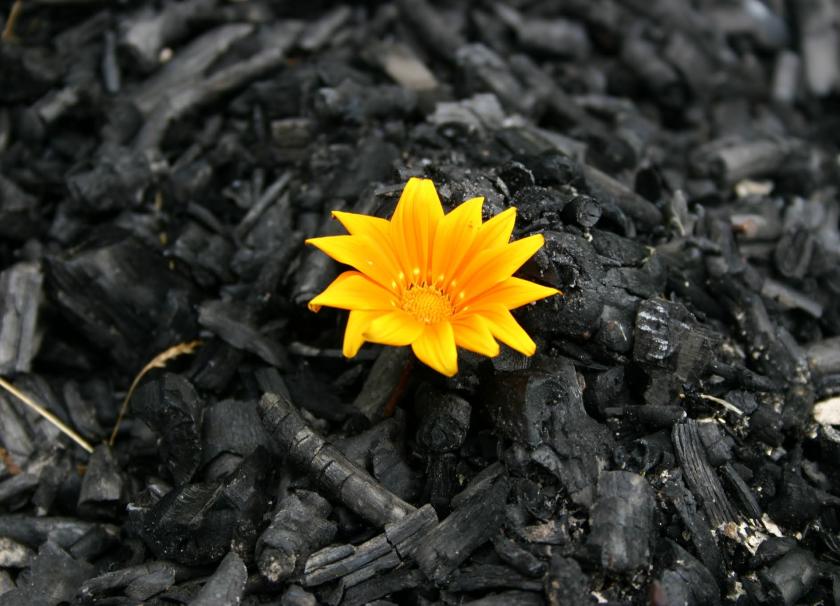
Support Co-op staff to rebuild
The Ashland Food Co-op is dedicated to helping our community and our staff rebuild after the Almeda Fires in early September.
For immediate support, the Co-op gave $1,000 to staff who lost their homes in the fires, as well as $250 for food and other household needs for anyone displaced due to a level 3 evacuation order.
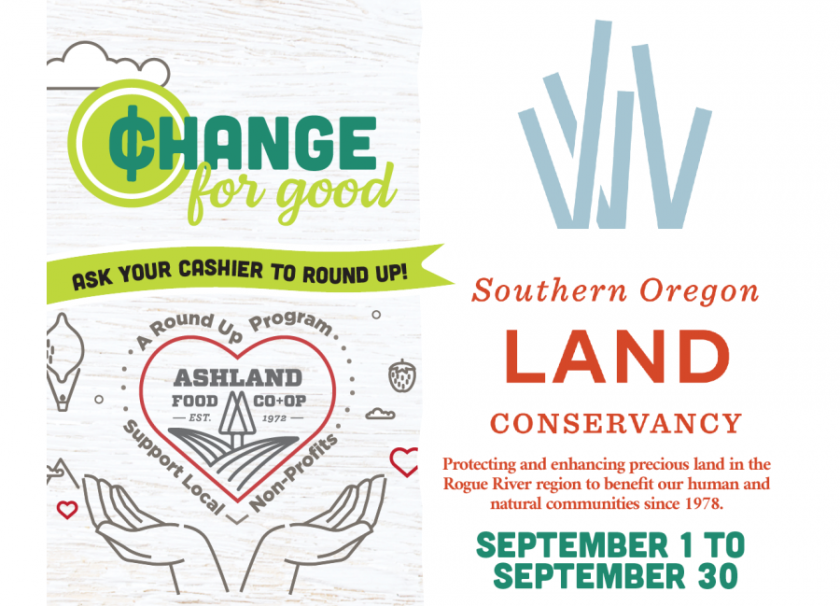
Change for Good in September: Southern Oregon Land Conservancy
For the month of September, Ashland Food Co-op shoppers can round up at the register to support Southern Oregon Land Conservancy. Since 1973, SOLC has been working on multiple fronts to improve land quality and conservation for humans and nature alike. Check out some of the projects below that SOLC has been working on recently. And mark your calendar for Saturday, October 24, as SOLC hosts an Open Lands Day hike and tour on the Rogue River Preserve.
Free Monday Night Lecture - Some Cool Science about Breathing
Join Kelly Martin as she explains how your breath impacts everything from ankle sprains to headaches. Learn why belly breathing isn't good for you, how to breathe correctly, and how to maximize lung health, improve posture, enhance walking efficiency, reduce anxiety, and improve sports performance.
Access the Zoom recording here.
Zoom access password: 2zu@KQWU
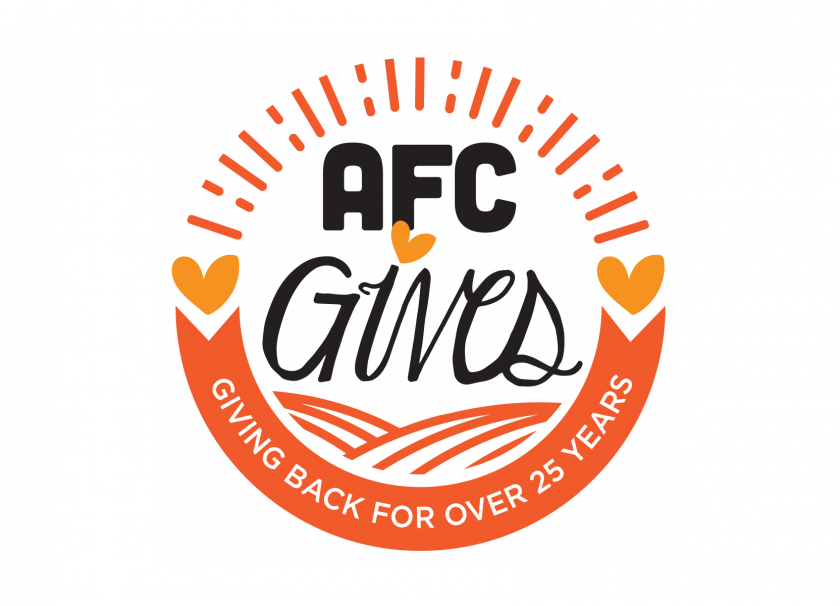
Chatting about community giving with JPR's "Jefferson Exchange"

Change for Good in August: KS Wild
This month's featured organization in the new Change for Good register round-up program is KS Wild (short for Klamath-Siskiyou Wildlands Center).

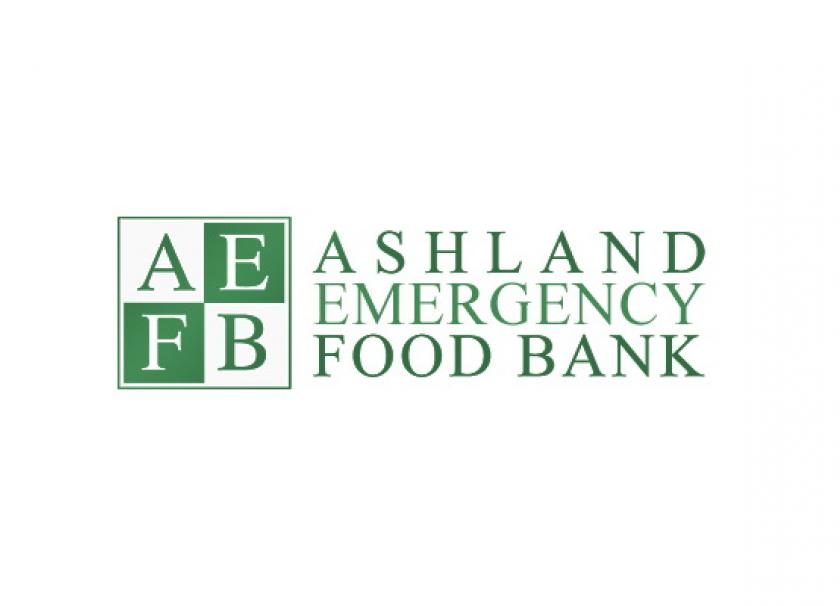
Get to know Ashland Emergency Food Bank
The sixth cooperative principle, "Concern for Community," has become even more important since the pandemic began and economies, locally and globally, started to constrict. To address this, the Board of Directors agreed in April to release 100% of patronage dividends and designate Ashland Emergency Food Bank as a donation option for those dividends - resulting in over $20,000 in donations. And with the early launch of Change for Good register round-up, AEFB was a natural choice to receive round-up donations.

July / August GM Update: Walking the Walk
I wrote at the beginning of the year that the Co-op model of business was a blueprint for the future. The concept of “planet, principles and people before profit” is a guide for how cooperatives can run a successful business that puts more back into the community and local economy than national chains, while using less resources and creating less waste.

2020 Co-op Election Results
2020 Co-op Election Results
Ashland Food Co-op owners voted for three open seats on the Board of Directors, and for ten non-profit organizations for the Change for Good register round-up program.
Click a name below to read more about that Co-op Board member.
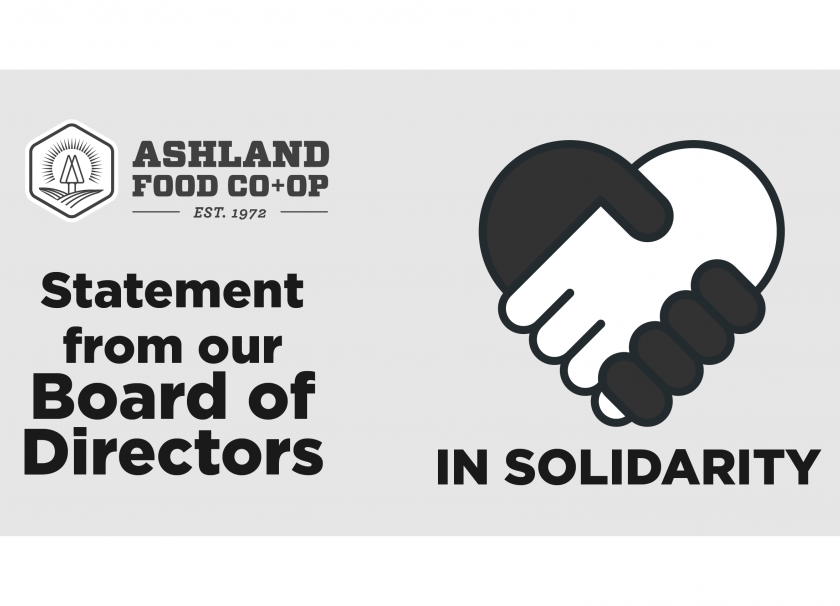
A statement from the Board of Directors on racial justice
Dear Ashland Food Cooperative Family and Community,
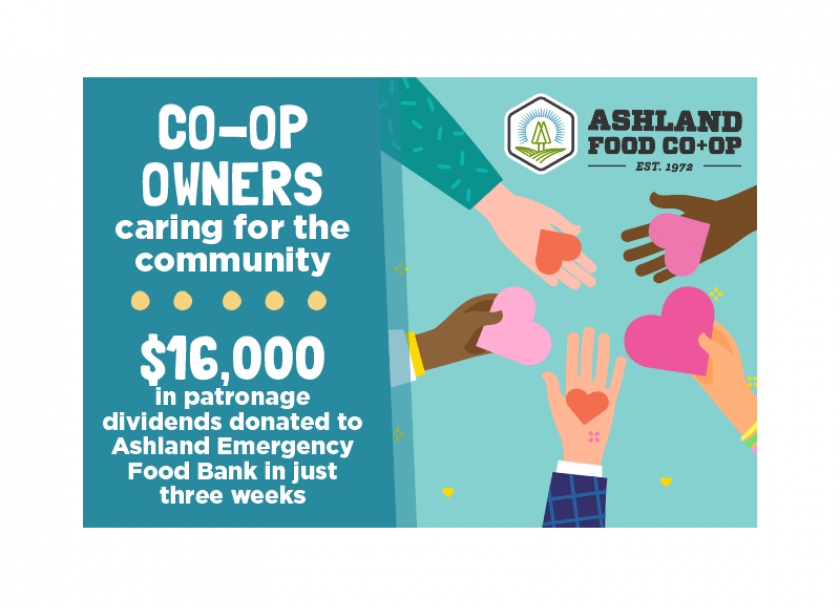
Co-op Owners Step-Up to Support the Ashland Emergency Food Bank!
AFC and AEFB Press Release - Local Strength!
Release Date: 5-26-2020
In April, the Ashland Food Co-op Board of Directors announced to the community that the Co-op would be returning 100% of the 2019 Patronage Dividend to its owners. The 100% Patronage Dividend return to Co-op owners converted to over $628,000.
The Co-op Board felt in this time of great need it was not the right time for the Co-op to put away funds for the future, but rather to support owners fully so they may have more strength to weather these stormy times.
Free Monday Night Lectures - virtual and recorded
Thanks to the many agile and adaptable experts in the Rogue Valley, the much-loved Free Monday Night Lectures live on - even if everything is moving online.
While we miss seeing community members with a joy of learning showing up at the Co-op Classroom, we hope these recordings teach and inspire you.
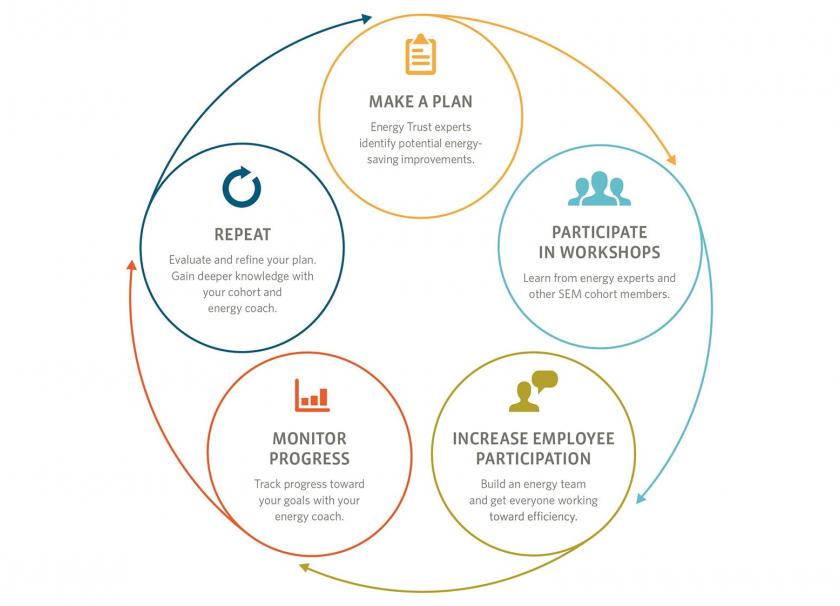
An update on Strategic Energy Management at the Co-op
By Nina Friedman, Strategic Energy Management intern

.jpg)